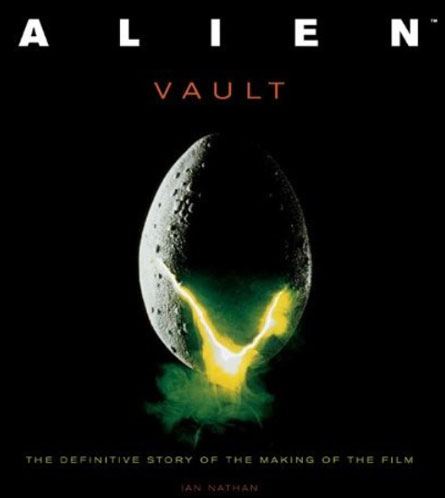Empire Magazine’s Ian Nathan recently released his book Alien Vault, packed full of information on the seminal film, such as unseen set photos, sketches, H.R. Giger’s concept artwork, script pages and reproductions of Ridley Scott’s annotated storyboards.
Ian Nathan led a panel at the London MCM Expo, interviewing the film’s associate producer, Ivor Powell, and special effects supervisor Brian Johnson, both of whom had met after working on Stanley Kubrick’s 2001: A Space Odyssey. Together they reminisced about their time together working on the horror classic.
It all started with Dan O’Bannon’s script, which Ivor described as, “manna from heaven,” after reading it, and because of his love for sci-fi felt it was, “the sort of movie I wanted to make all my life.”
Brian similarly explained that it was, “one of the best things I’d ever read and was really glad that I was asked to work with the production. It’s not often we get a script that really spells it out in the subtlest way what is actually going to happen in the movie,” he continued. “You could actually feel the creepiness of it.”
As much as Ivor loved the script, he said he was presented with a problem, which was, “How the hell do you budget for something like that?”
“The thing with Ridley was, he could sketch us in quite a lot of detail of things that he wanted,” said Brian on his director. “He was actually, in my book, one of the best directors we worked with, because he did, in terms of visual effects, know pretty much what he wanted.” However, he did have quite a temper.
“He could be volatile,” said Ivor. “I remember the door to my office had a glass panel in it and I think the glass in the panel had to be replaced at least three times during the making of the movie, when Ridley had lost his temper over something or other, and slammed it on his way out. He was difficult, but he could be fun.”
Alien wouldn’t be Alien without H.R. Giger, who Ivor described as resembling a vampire! “Giger was this fearsome, strange guy,” recalls Ivor. “Always used to dress in black, his pale face looked like he’d powdered it. He has, as Brian will endorse, a wonderfully dry sense of humour. Without his vision, without this concept of behaviour, the film would not really be half as good as it turned out to be. His idea for the sets gave it that strange quality that I think will make the movie indestructible.” He then shared an enduring memory of Giger working on the alien. “He said, ‘If I’m going to build the prototype of the alien, I need bones, I need clay.’ So then they gave him lots of bones, lots of clay to work with, and he used to work at night. He was given privacy on this massive stage, and I remember peering down at him one night just before all of us were going home. He was starting to work, and as usual, dressed in black. He was just standing there sculpting this big life form prototype of the alien, which was the weirdest image you could imagine.”
“He played jazz piano to us on many occasions,” said Brian of Giger. “Because he had a good sense of humour, because he was interested in mechanical things, he spent a lot of time talking to my blokes in the workshop, playing with all our tools that we had.”
As production on the film got underway, Ivor felt that they knew they were making something, “a little bit special,” and that the cast became very competitive, “because as in the script, each one of them were basically going to get knocked off and killed by this alien. Only Sigourney [Weaver] who was this newcomer was going to be the one who was going to survive, and it irritated certain members of the cast, certainly Yaphet Kotto. He used to try and ambush Ridley before shooting each day on the set, saying, ‘Are you sure I’m going to die? Are you sure it shouldn’t be me killing the alien finally?’”
Both Brian and Ivor recalled reactions the film received during test screenings. Brian shared what happened during one such screening in Los Angles: “I got in the cinema, along with a lot of other Hollywood people in one form or another, and Ridley had wound up the sound on everything, so there was massive reverb. When it got to the chestburster, there were people actually crawling up the aisle from their seats to get out of the cinema, because they were so terrified with the chestburster. That’s when I knew they really got a hit on their hands.”
Ivor revealed what happened when the film previewed in Dallas: “All the 20th Century Fox executives, and Ridley and myself, were standing at the back, just gauging everybody’s reactions. The Fox executive Alan Ladd Jr. was one of them, and was looking nervous. Certainly, women were quite powerfully affected by it and disturbed by it. A couple of people passed out or puked in the loos and things. [Fox] were completely nervous.”
“I think it was one of the first horror movies that was taken seriously and not treated like a low budget horror movie,” said Ivor, looking back at when the film was finally released. “As such it’s found a niche in movie history.”
Ian wrapped the panel by asking them about their thoughts on the sequels and the forthcoming release of Ridley Scott’s Prometheus. “I think Jim Cameron’s Aliens worked really well,” said Brian, who worked on the sequel. “I’m looking forward to seeing Prometheus.”
“I sadly wasn’t involved with the sequels,” said Ivor. “I thought Jim Cameron’s was fantastic. My preference lies in making another film with a single beast, like the first Alien, because that’s what really interests me, the alien, and I still feel slightly thwarted and frustrated that one hasn’t found out, or in any subsequent film about the alien, what really makes it tick, which maybe Prometheus will explore.”
Originally published on MCM Buzz on 2 November 2011.




